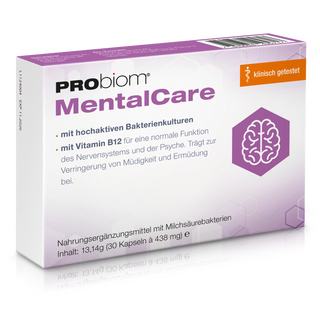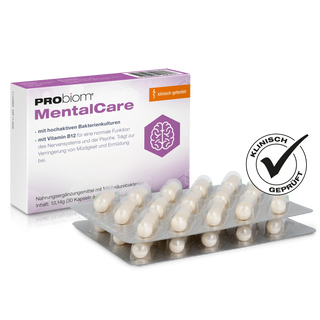Durchschlafstörungen sind ein weitverbreitetes Problem, das die Lebensqualität erheblich beeinträchtigen kann. Häufig wird bei der Ursachenforschung auf Stress, psychische Belastungen oder hormonelle Veränderungen verwiesen. Doch immer mehr Studien zeigen, dass ein scheinbar unerwarteter Faktor eine entscheidende Rolle spielen kann: das Darmmikrobiom. Dieser Blogbeitrag beleuchtet, welche Mängel mit Durchschlafstörungen in Verbindung stehen, wie das komplexe Ökosystem im Darm unsere Schlafqualität beeinflusst und welche Rolle Probiotika bei der Regulation spielen können.
Zusammenhang zwischen Mangelzuständen und Durchschlafstörungen
Schlaf ist ein hochkomplexer Prozess, der von zahlreichen körperlichen Systemen gesteuert wird. Ein Mangel an bestimmten Nährstoffen oder biochemischen Vorläufern kann den Schlaf negativ beeinflussen. Besonders relevant sind:
-
Serotonin und Melatonin: Diese Neurotransmitter steuern den Schlaf-Wach-Rhythmus. Serotonin wird teilweise im Darm produziert, was das Darmmikrobiom direkt mit der Schlafregulation verbindet.
-
Vitamin D: Ein Mangel kann mit schlechter Schlafqualität korrelieren, da Vitamin D Einfluss auf das Nervensystem hat.
-
Magnesium: Essenziell für die Muskelentspannung und Nervensignalübertragung, sein Mangel wird häufig mit Schlafproblemen assoziiert.
Doch was viele nicht wissen: Die Aufnahme und Synthese dieser Substanzen hängt maßgeblich vom Zustand des Darmmikrobioms ab.
Das Darmmikrobiom als Schlüsselfaktor für gesunden Schlaf
Das Darmmikrobiom bezeichnet die Gemeinschaft von Billionen Mikroorganismen im Darm, die eine zentrale Rolle in der Verdauung, Immunabwehr und sogar der Gehirn-Darm-Achse spielen. Über diese Achse kommunizieren Darm und Gehirn über Nervenbahnen, Hormone und Immunbotenstoffe. Ein Ungleichgewicht im Mikrobiom (Dysbiose) kann die Produktion von Schlaf-regulierenden Neurotransmittern stören und Entzündungsprozesse fördern, die den Schlaf negativ beeinflussen.
Studien belegen, dass eine vielfältige und ausgewogene Darmflora positive Effekte auf die Schlafqualität hat. Bestimmte Bakterienstämme sind in der Lage, die Produktion von Serotonin im Darm zu erhöhen und dadurch die Melatoninbildung im Gehirn zu fördern. Umgekehrt führt eine reduzierte Diversität oft zu Schlafstörungen, da das Gleichgewicht der Neurotransmitter gestört wird.
Probiotika – Helfer für besseren Schlaf?
Probiotika sind lebende Mikroorganismen, die bei ausreichender Einnahme gesundheitsfördernde Wirkungen entfalten können. Durch gezielte Supplementierung lassen sich häufig Defizite im Darmmikrobiom ausgleichen. Besonders relevant sind Stämme aus den Gattungen Lactobacillus und Bifidobacterium, die erwiesenermaßen positive Effekte auf das Schlafverhalten haben können.
Probiotika unterstützen nicht nur die Regeneration einer gesunden Darmflora, sondern fördern auch die Synthese schlaffördernder Stoffe und reduzieren Entzündungsreaktionen. Erste klinische Studien zeigen, dass Menschen mit chronischen Durchschlafstörungen von einer probiotischen Therapie profitieren können, indem sie schneller einschlafen und länger durchschlafen.
Fazit: Ein unterschätzter Mangel bei Schlafproblemen
Durchschlafstörungen sind oft multifaktoriell bedingt, aber ein Mangel, der häufig übersehen wird, ist das Ungleichgewicht im Darmmikrobiom. Dieses beeinflusst essenzielle biochemische Prozesse und die Produktion schlafrelevanter Neurotransmitter. Die gezielte Unterstützung durch Probiotika kann hier einen wertvollen Beitrag leisten, um das Mikrobiom zu stärken und dadurch die Schlafqualität nachhaltig zu verbessern.
Wer also an chronischen Schlafproblemen leidet, sollte neben klassischen Ursachen auch den Darm und seine Mikroorganismen als mögliche Wurzel des Problems in Betracht ziehen.













